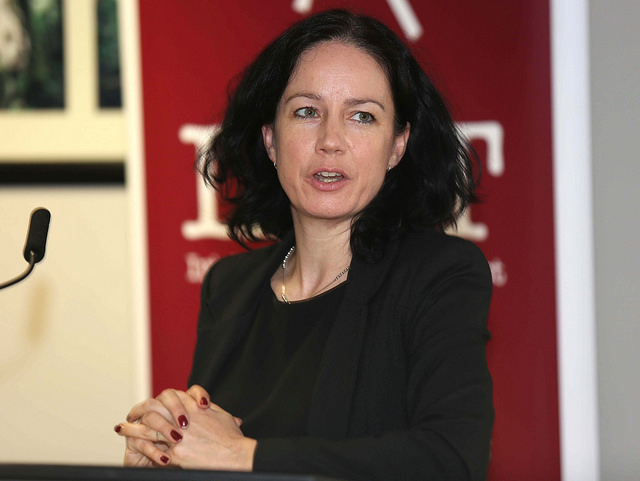Seminar to hear calls for alternative approach to young offenders

Fíona Ní Chinnéide
Alternative sentencing and policy approaches are needed to reduce the offending rate among young adults, the Irish Penal Reform Trust (IPRT) has said.
Speaking ahead of a seminar on youth justice this afternoon, IPRT executive director Fíona Ní Chinnéide said young adults are more responsive to rehabilitative measures than older adults, but the wrong interventions can limit opportunities and deepen offending behaviour.
The seminar, co-hosted by IPRT and the Irish Criminal Bar Association, will examine the need for a separate approach for 18-24-year-olds in the criminal justice system, with a focus on sentencing policy, diversion, alternatives to prison and the possibility of extending current spent convictions legislation for young people.
David Stanton, minister of state for justice and equality, will open the seminar, which will also hear from Senator Lynn Ruane, who is taking forward a bill to expand Ireland’s spent convictions regime; Dr Laura Janes, legal director for the Howard League for Penal Reform in the UK; Ian Power, CEO of SpunOut.ie; Eddie D’Arcy, CEO of SOLAS; and barrister-at-law Sarah-Jane Judge.
Ms Ní Chinnéide said: “Internationally, there has been an increasing focus on transitions into adulthood as an opportunity for positive change, with an acknowledgement that brain development and maturing continues well into early adulthood.
“Evidence shows that most people ‘age-out’ of criminal activity in their late twenties, however, it is IPRT’s view that while the right interventions can support desistance, the wrong interventions can deepen offending behaviour.
“The aim of our seminar is to highlight the robust and growing body of evidence that advocates for an approach that considers the special circumstances of young people transitioning into adulthood.
“Supervised bail support, diversion programmes, intensive community orders, the extended application of spent convictions and restorative justice practices are among the more effective responses to crimes committed by young adults.”
She added added: “It is our view that a distinct strategy towards dealing with young adults in conflict with the law is required. This strategy should be grounded in the evidence of what works to support desistance among young adult offenders.
“The new Youth Justice Strategy, currently under development, presents a great opportunity for positive innovative change for this age group.”
Mr Stanton added: “The Government is in the process of developing a new Youth Justice Strategy, which will set out evidence-based information and targeted interventions to reduce youth offending and to achieve better outcomes for young people who get into trouble with the law. For me, a key priority is prevention and early intervention.
“I can’t stress enough the importance of bringing relevant agencies and programmes together to ensure that the young people most at risk receive the required support and care. The work on the New Youth Justice Strategy also includes taking forward the programme for Government Commitment on examining possible alternative arrangements for 18-24-year-olds. With this in mind, I am delighted to attend today’s event and look forward to hearing the perspectives of all speakers.”











